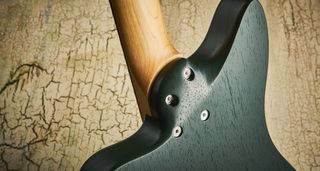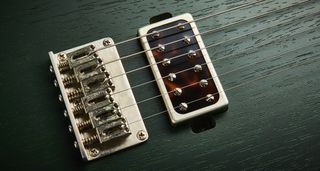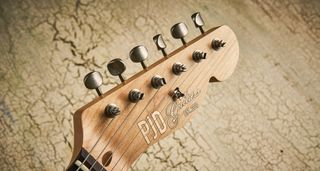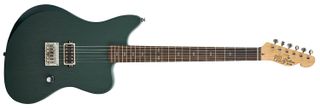These will be limited, only available direct from PJD, and on this evidence if you’ve got any kind of rock ’n’ roll heart then we’d strongly suggest you place your order. An antidote for the complex modern world, it certainly reminds us why we got into this whole lark in the first place. Superb stuff.
Pros
+
Superb pared-down, high-level craft.
+
Quality hardware.
+
Light weight.
+
Mainstream neck profile.
+
First-class playability.
+
Hot-vintage single humbucker.
Cons
–
Junior fans might miss a tone control and that old-style circuit.
You can trust Guitar World
Our expert reviewers spend hours testing and comparing guitar products so you can choose the best for you. Find out more about how we test.
Whatever the reasons, we could suggest there’s a bit of a trend emerging: the stripped-down, high-quality electric guitar that’s far from hard on your income. It was the theme of our last cover story and, working on that, we got wind of a new entry, PJD’s new Apprentice.
We say ‘new’ because the brand released some small runs of single-soapbar-pickup models back in 2022, with lightly reliced gloss nitro finishes, which were the first to introduce the gold decal logos now standard for all its models.
Those guitars were very special, but nudging £2k, they were hardly impulse buys. This new version very nearly is. We’re not saying £899 is pocket change, but for a UK-made, quality-led, satin-finished, obeche-bodied single-pickup guitar with a hand-wound humbucker… Well, we rest our case.
In the flesh, there’s nothing cut-price in this cleanly presented St John offset guitar (PJD’s most popular body shape). It’s not unique to PJD, of course, but its take on the theme exudes some style, not least in the moody Nato Olive finish (a vintage Porsche colour, we’re told). Full-scale offsets can be weighty: not here.
Yes, it’s a big slab body, but it’s slightly downsized from the original Fender outline and looks and feels pretty contemporary with that forearm chamfer but without a rear ribcage cut.

(Image credit: Future / Phil Barker)
The same level of Gotoh hardware that’s used on PJD’s Standard and Custom Shop models features here and it’s lightly reliced, the fingerboard edges are nicely worn in, the neck back is low gloss with a light tint.
Stripped-down guitars like this might well be a sign of the times, but, as ever, done well that simplicity is refreshingly liberating
Fretwork has never been an issue on any PJD we’ve had in our hands, and with the company having only recently installed a Plek setup machine, things just seem to be subtly smoother.
As the name implies, the Junior style means a single pickup: a direct-mounted PJD Wadfather humbucker, which uses 43 AWG coil wire and an Alnico V magnet with a DCR reading of around 13.52kohms.
It has an open-topped cover, 12 adjustable screw poles, with the coils hidden under a tortoiseshell plastic plate, which is a proper celluloid acetate sourced from Italy. It gives the design a centre point, not to mention a retro-modern motif. And to keep with the stripped-down style, there’s just a single volume control. No tricks.

(Image credit: Future / Phil Barker)
Feel & Sounds
With basically just one sound, any Junior-style guitar has to deliver from the off – and the flavour here is beefy hot-rod PAF. The whole guitar feels very alive in your hands. In that regard, it certainly references a good Les Paul Junior. There’s punch and power, but it’s not overthick, and there’s a grainy detail to the big voice, while pulling back the volume nudges down the high-end, subtly producing strong, strident jangle.

(Image credit: Future / Phil Barker)
Unlike a good Les Paul Junior, there’s no tone control, nor that old-school circuit, but the rear cavity is purposely routed for PJD’s standard two-control (volume and tone) setup, so you could easily add a tone control, perhaps with a coil-split via a pull-pot and even a simple treble bypass circuit – all are simple mods. But, as is, this is a big, solid-sounding rock voice and would make a superb slide guitar, too.
We don’t know whether it’s the light ageing, but the neck here feels more like a good, well-played vintage Fender
We don’t know whether it’s the light ageing, but the neck here feels more like a good, well-played vintage Fender, with a nut width of 42mm (plus a perfectly cut bone nut), a depth at the 1st fret of just over 21mm and just under 23mm by the 12th, with a quite full ‘C’ profile.
Like the Standard models, we get Jescar 55090 fretwire, medium with a good height, on the single radius 254mm (10-inch) rosewood fingerboard. With the perfect fretwork and that Plek setup, it makes for a really engaging player. But, really, this isn’t a guitar where you want to sweat the specs and details. It just needs a stage.
Verdict

(Image credit: Future / Phil Barker)
Stripped-down guitars like this might well be a sign of the times, but, as ever, done well that simplicity is refreshingly liberating. And while PJD’s original Apprentice certainly didn’t disappoint, this new version distils the concept further and, of course, pulls the price down to a point where you wonder if it’s actually viable.
These will be limited, only available direct from PJD, and on this evidence if you’ve got any kind of rock ’n’ roll heart then we’d strongly suggest you place your order. An antidote for the complex modern world, it certainly reminds us why we got into this whole lark in the first place. Superb stuff.
Specs
PRICE: £899 (approx $1,149 / inc gigbag)ORIGIN: UKTYPE: Offset-shaped solidbody electricBODY: ObecheNECK: Maple, bolt-onSCALE LENGTH: 648mm (25.5”)NUT/WIDTH: Bone/42mmFINGERBOARD: Rosewood, rectangular white acrylic inlays, 254mm (10”) radiusFRETS: 22, medium (Jescar 55090)HARDWARE: Gotoh string-through 6-block saddle bridge, Gotoh vintage-style SD91 split-post tuners – light aged nickel-platedSTRING SPACING, BRIDGE: 52.5mmELECTRICS: Direct-mount PJD Wadfather w/ open cover, master volumeWEIGHT (kg/lb): 2.79/6.15OPTIONS: Colour onlyRANGE OPTIONS: Expect a similar-spec Carey Apprentice later this year. PJD’s Carey, York, St John and Woodford start in the new Standard spec at £1,299; all come with Bigsby vibratos as the Standard Plus (the Woodford uses a synchronised vibrato) and are priced at £1,499. PJD also now offers a custom service (£POA)LEFT-HANDERS: YesFINISHES: Nato Olive (as reviewed) – low-gloss open-pore nitro body; satin nitro neck backCONTACT: PJD Guitars

Thank you for reading 5 articles this month**
Join now for unlimited access
US pricing $3.99 per month or $39.00 per year
UK pricing £2.99 per month or £29.00 per year
Europe pricing €3.49 per month or €34.00 per year
*Read 5 free articles per month without a subscription

Join now for unlimited access
Prices from £2.99/$3.99/€3.49
Dave Burrluck is one of the world’s most experienced guitar journalists, who started writing back in the ’80s for International Musician and Recording World, co-founded The Guitar Magazine and has been the Gear Reviews Editor of Guitarist magazine for the past two decades. Along the way, Dave has been the sole author of The PRS Guitar Book and The Player’s Guide to Guitar Maintenance as well as contributing to numerous other books on the electric guitar. Dave is an active gigging and recording musician and still finds time to make, repair and mod guitars, not least for Guitarist’s The Mod Squad.
>>> Read full article>>>
Copyright for syndicated content belongs to the linked Source : GuitarWorld – https://www.guitarworld.com/reviews/pjd-guitars-st-john-apprentice-review















